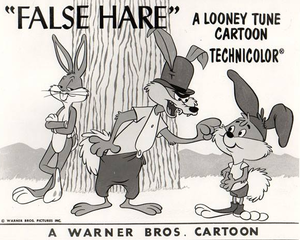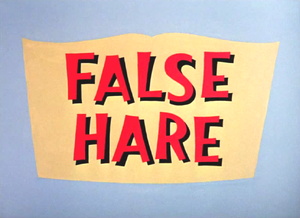False Hare
From Looney Tunes Wiki
Jump to navigationJump to search
| False Hare | |
|---|---|
 Lobby card. | |
| Production company | Warner Bros. Cartoons |
| Distributor | Warner Bros. Pictures |
| Release date | July 18, 1964 |
| Starring | Mel Blanc |
| Producer(s) | David H. DePatie |
| Music composition | Bill Lava |
| Story | John Dunn |
| Animation | Warren Batchelder George Grandpré Ted Bonnicksen |
| Director(s) | Robert McKimson |
| Series navigation | |
| ← Previous | Next → |
| Title card | |

| |
False Hare is the four hundred and forty-first Looney Tunes theatrical short. It was distributed by Warner Bros. Pictures on July 18, 1964. It was written by John Dunn, produced by David H. DePatie, and directed by Robert McKimson.
The Big Bad Wolf and his nephew decide to lure Bugs over with a fake rabbit club, so the rabbit decides to play along to foil the Wolf's attempts to do him him.
Detailed summary
Memorable quotes
Bugs: I wonder which one of them will chicken out first?
Characters
In order of appearance: | ||||||||||
| ||||||||||
Locations
- Earth
- United States
- Forest
- Big Bad Wolf's house
- Forest
- United States
Objects
- "Club Del Conejo" notice sign
- Safe
- Spiked casket
- Board with hole
- Cannon
- Dynamite and gunpowder canister
- Chicken hat
Production
Development
Filming
Music
The music was composed by Bill Lava.
Release
Dates are in order of release:
- United States: July 18, 1964 in theatres
Behind the scenes
- The title is a "hare/hair" pun on two things, one of them is "false hair", as in a wig; and another being "Falscher Hase", a German type of meatloaf.
- The club name, Del Conejo, is a Spanish word for "rabbit."
- This cartoon is known for the following marks:
- This is the last golden age cartoon to feature the Big Bad Wolf, the Wolf's nephew, Bugs Bunny, and although having made a small cameo appearance, Foghorn Leghorn.
- It was the last Looney Tunes-series cartoon to use both the colored bullseye rings since the 1935 Merrie Melodies cartoon Flowers for Madame.
- It is also the last Warner Bros. Cartoons short to use the "That's all folks!" closing titles.
- This is the last short to use Milt Franklyn's renditions of "The Merry-Go-Round Broke Down".
- It is the last short under the Warner Bros. Cartoons unit to feature any recurring characters.
- It is the last completed cartoon before Warner Bros. Cartoons was shutdown in 1963, although it was the second-to-last short released as Señorella and the Glass Huarache would be the last released, despite the latter being completed in 1961, as opposed the former being completed two years later.
Errors
- When the short was Looney Tunes Super Stars' Bugs Bunny: Hare Extraordinaire DVD, it was cropped to a widescreen format. However, it was later reverted to fullscreen in the Bugs Bunny 80th Anniversary Collection Blu-ray set.
Home availability
- United States